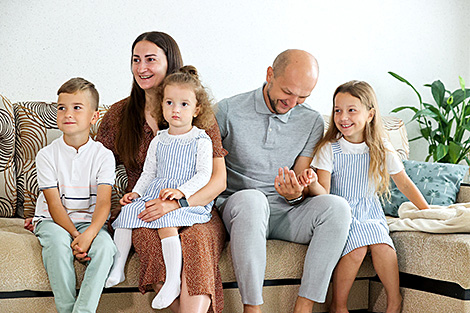News & Events in Belarus
Lukashenko signs law to increase public welfare benefits for families with kids

An archive photo
MINSK, 8 July (BelTA) – Belarus President Aleksandr Lukashenko signed the law on amending laws regulating welfare payments for families with kids. The document has been passed to increase the level of minimal guarantees for citizens during periods of their social vulnerability, BelTA has learned.
Higher maternity allowances for women
In particular, the law provides for raising the minimal size of the maternity allowance. For women, whose mandatory insurance payments are paid to the social protection fund and who have less than 6 months of work experience (young specialists, women who are about to start working), the allowance will rise from 50% of the subsistence wage to 100% of the minimal monthly wage. For those, whose mandatory insurance payments are not paid to the social protection fund, but who are eligible for this kind of welfare (students, women in active service, registered unemployed women), the allowance will rise from 50% of the subsistence wage to 100% of the subsistence wage.
The document also provides for an increase in the minimum size of the temporary disability allowance for child care for insured women with less than 6 months of work experience. This allowance will increase from 50% of the minimum monthly wage to 100% of the minimum monthly wage (similarly to the maternity allowance).
Innovations in allowances for children over 3 years old for families
The legislative innovations also affect certain categories of families with children over 3 years old. In particular, the right has been preserved to assign this allowance to families with minor children, in which a disabled child has reached the age of 18 years, he or she has disability group I and one of the parents takes care of him or her and receives the corresponding allowance. This allowance can also be granted for a child, who is brought up in the mother’s family, if the father of the child, who is obliged to pay alimony, is on compulsory military service or alternative service.
Stronger social support for parents of disabled children
Social support for families with a disabled child has been increased. Thus, the law allows parents to receive all types of state benefits during the short-term stay of the disabled child in a children’s home where the child needs to get medical and social aid. In addition, the rights to receive temporary disability allowance for taking care of a disabled child during his or her sanatorium and resort treatment or medical rehabilitation are expanded if there are several disabled children in the family. In those cases the right to receive the benefit can be granted to another person (not a parent) if the parent is busy caring for another disabled child, or two benefits if both disabled children in the same period need sanatorium treatment, rehabilitation and they are accompanied by different persons.
Stricter oversight for negligent parents
At the same time oversight over the proper use of state benefits is tightened with regard to families where children have been found in an unfavorable environment. In particular, the government bodies and organizations that assign and pay allowances are now obliged to disclose information about recipients of the allowances and members of their families at the request of educational institutions, which conduct social investigations, as well as juvenile affairs commissions. The law stipulates that the payment of allowances ceases the day when a court ruling to remove the child enters into force or the day when a children’s services agency or a juvenile affairs commission decides to remove the child.
The law comes into force on 1 January 2025.







 print version
print version make home page
make home page add to bookmarks
add to bookmarks

